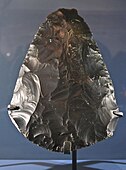-
 Discoid hand axe
Discoid hand axe -
 Cordiform hand axe
Cordiform hand axe -
 Amygdaloid hand axe
Amygdaloid hand axe

Summary
Lynford Quarry is the location of a well-preserved in-situ Middle Palaeolithic open-air site near Mundford, Norfolk.
The site, which dates to approximately 60,000 years ago, is believed to show evidence of hunting by Neanderthals (Homo neanderthalensis). The finds include the in-situ remains of at least nine woolly mammoths (Mammuthus primigenius), associated with Mousterian stone tools and debitage. The artefactual, faunal and environmental evidence were sealed within a Middle Devensian palaeochannel with a dark organic fill. Well preserved in-situ sites of the time are exceedingly rare in Europe and very unusual within a British context.[1]
The site also produced rhinoceros teeth, antlers, as well as other faunal evidence. The stone tools on the site numbered 600, made up of individual artefacts or waste flakes. Particularly interesting were the 44 hand axes of sub-triangular or ovate form.[2]
The site was dated to Marine Isotope Stage 3 using Optically Stimulated Luminescence dating of the sand from the two layers of deposits within the channel.[2]
See also edit
References edit
Notes
- ^ Donoghue 2006.
- ^ a b Boismier 2002, p. 55.
Bibliography
- Boismier, B. (2002). "Lynford Quarry, A Neanderthal butchery site". Current Archaeology. 16 (182): 53–58.
- Donoghue, J (2006). "The Lynford mammoths: slaughtered by Neanderthals?". Current Archaeology (205): 40–44.
External links edit
- "Lynford Quarry, Mundford, Norfolk". English Heritage. 30 May 2003. Archived from the original on 14 February 2006. Retrieved 17 August 2014.





